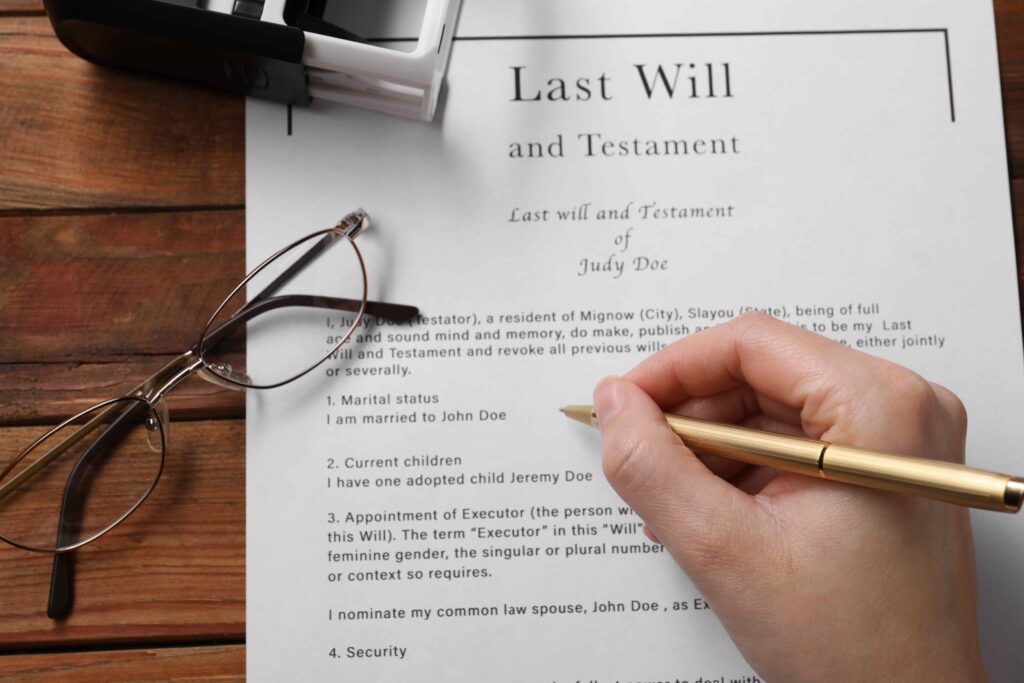An Alabama will attorney helps you create legally valid documents that protect assets, provide for loved ones, and prevent costly disputes. Southern Estate Lawyers guides families through comprehensive estate planning, making the complex process clear and manageable.
Your will determines who inherits your property, raises your children, and manages your estate. Without proper legal guidance, simple errors can invalidate your will, triggering Alabama’s intestacy laws that may contradict your wishes. Our experienced will lawyers are here to help draft a document that meets strict state requirements while addressing what matters most to you and your loved ones.
Key Takeaways
- – Alabama law requires specific formalities for valid wills, including proper witnessing by two adults and clear testamentary intent
- – Working with an Alabama will attorney helps avoid common mistakes that could invalidate your will or create disputes among heirs
- – Comprehensive estate planning includes not just wills but also powers of attorney, healthcare directives, and potentially trusts
- – Regular updates to your will reflect life changes like marriage, divorce, births, or significant asset acquisitions
Why Choose Us as Your Will Attorney in Alabama
Southern Estate Lawyers brings decades of combined experience helping families throughout Jefferson, Baldwin, and Mobile counties create effective estate plans. Our estate planning attorneys stay current on Alabama probate laws and local court procedures, so your documents meet legal requirements while also addressing your unique circumstances.
We understand that discussing end-of-life decisions feels intimidating. Our compassionate approach makes the process manageable. During your free consultation, we’ll review your assets, family situation, and goals. This allows us to recommend appropriate estate planning tools beyond basic wills, including trusts litigation, powers of attorney, and healthcare directives, building a plan that meets your needs.
Our three convenient office locations serve clients across Alabama. Whether meeting at our Birmingham office near the Jefferson County Courthouse, our Foley location serving Baldwin County residents, or our Mobile office, you’ll receive the same attentive, professional service. We take time to explain each document’s purpose in plain English, so you understand how your will protects your loved ones.
Legal help with wills in Alabama doesn’t have to be overwhelming or expensive. Southern Estate Lawyers offers transparent pricing and flexible consultation options, including phone and video meetings for those unable to visit our offices. Contact us at (251) 444-7000 to schedule your free consultation and take the first step toward securing your family’s future.
Understanding Alabama Will Requirements

Alabama Code Title 43-8-130 et seq. establishes specific requirements for creating valid wills. To be valid, the testator (person making the will) must be at least 18 years old and of sound mind. Two witnesses must observe you signing the will or acknowledge your signature. While beneficiaries may legally serve as witnesses, their inheritance could face limitations. Choosing disinterested witnesses who receive nothing under the will could provide stronger protection against disputes.
Though not required for validity, a self-proving affidavit significantly streamlines probate proceedings. This notarized document, signed by you and your witnesses, eliminates the need for witness testimony during probate. Without it, the court may need to locate witnesses years later, causing delays and complications for your family.
What Happens Without a Will in Alabama
Dying without a valid will triggers Alabama’s intestacy laws, which determine asset distribution based on surviving family relationships. These default rules may not align with your wishes or your family’s needs.
The intestacy distribution scheme follows a specific hierarchy that prioritizes spouses and children of the decedent but may exclude important people in your life. An intestate estate will typically be distributed as follows:
- – Married with children: Spouse receives first $50,000 plus half the remaining estate; children share the other half.
- – Married with no children but with living parents: Your spouse receives the first $100,000 of your estate’s value, plus one-half of the remaining balance. Your parents inherit the rest.
- – Unmarried with children: Children inherit your entire estate in equal shares.
- – No spouse or children: Assets pass to parents, siblings, or more distant relatives in statutory order.
- – Unmarried partners, stepchildren, and close friends: Usually receive nothing under intestacy laws.
These rigid rules highlight why drafting a will in Alabama provides essential control over asset distribution. Without proper planning, intestacy laws and probate courts make these deeply personal decisions for you, potentially leaving loved ones unprotected or causing family disputes.
What Should Be Included in an Alabama Will?

An effective last will and testament addresses multiple crucial decisions beyond simple asset distribution. Our Alabama estate planning team helps clients create comprehensive documents that protect families and honor wishes through careful planning.
A properly drafted will in Alabama typically includes several essential components. These elements serve a specific purpose in protecting your family and ensuring smooth estate administration, including:
- – Asset Distribution Instructions: Detailed specifications for who receives real estate, personal property, financial accounts, and sentimental items
- – Executor Appointment: Designation of a trustworthy person to manage your estate through probate and carry out your wishes
- – Guardian Nominations: Selection of caregivers for minor children if both parents pass away
- – Trust Provisions: Creation of protective arrangements for minor beneficiaries or those with special needs
- – Residuary Clauses: Instructions for any assets not specifically mentioned elsewhere in the will
It is important to address these elements and any other assets or circumstances unique to your situation. Without addressing each element, your will may leave gaps that create confusion or conflict during an already difficult time for your family.
FAQ for Alabama Will Attorneys

Do I Need a Lawyer to Make a Will in Alabama?
While Alabama law permits self-drafted wills, working with an experienced will and estate lawyer in Alabama can help you with proper execution and comprehensive planning. Attorneys identify potential issues, suggest appropriate provisions, and coordinate wills with other estate planning documents. Professional guidance can help avoid costly mistakes that could invalidate wills or create family conflicts.
How Much Does a Will Cost in Alabama?
Will preparation costs vary based on complexity and additional estate planning needs. Simple wills for individuals with straightforward assets typically cost less than complex plans involving trusts or business interests. Southern Estate Lawyers provides transparent pricing during your free consultation, helping you understand costs before proceeding.
How Do I Update My Will in Alabama?
Life changes often require will updates to reflect new circumstances. You can update your Alabama will through a codicil (amendment) for minor changes or create an entirely new will for substantial revisions. Major life events like marriage, divorce, births, deaths, or significant asset changes typically warrant updates. Our attorneys review existing documents and recommend an appropriate update method so your will remains legally valid and aligned with current wishes.
What’s the Difference Between a Will and a Trust in Alabama?
Wills direct asset distribution after death through probate court proceedings. Trusts can operate during life and after death, potentially avoiding probate for trust assets. Our lawyers offer free consultations, including discussing whether trusts benefit your specific situation alongside traditional will planning.
Is Probate Required in Alabama with a Will?
Most estates require probate proceedings regardless of whether a valid will exists. However, proper planning can minimize probate complexity and costs. For instance, small estates may qualify for simplified procedures. Our Alabama wills and estates law firm helps families understand probate requirements and plan accordingly.
What happens to my digital assets when I die?
Digital assets, like social media accounts, online photos, and cryptocurrency, are part of your estate. Alabama law allows you to appoint a fiduciary in your will with the authority to manage these assets.
Without explicit instructions, your family may struggle to access, manage, or close your digital accounts. We can help you include provisions in your will to address your digital legacy.
What if I own property in another state?
Your Alabama will controls the distribution of your personal property wherever it is, but it only controls real estate located within Alabama. If you own real estate in another state, you may need a separate probate process there, known as ancillary probate. We can discuss strategies, such as using a trust, to avoid this complicated and often costly process.
Do I need to list every single item I own in my will?
No, you do not need to itemize every possession. Most wills distribute property in broad categories, such as “my personal effects” or “my residuary estate.” However, if you want a specific item, like jewelry or artwork, to go to a specific person, you should clearly state that in your will. You can also use a separate document called a personal property memorandum, if referenced in your will, to dispose of tangible personal property.
Take the Next Steps: Contact an Alabama Will Lawyer
Your family deserves the security of a properly drafted will that honors your wishes and prevents disputes. Southern Estate Lawyers provides compassionate guidance through every step of will creation, ensuring your documents meet Alabama’s legal requirements while addressing your unique family needs.
With offices in Birmingham, Foley, and Mobile, we make estate planning accessible through flexible consultations and transparent pricing. Call (205) 990-7000 today for your free consultation. Let our experienced Alabama will attorneys help you create the peace of mind that comes from knowing you protected your loved ones.
Law Offices Of Southern Estate Lawyers
Address: 4505 Pine Tree Circle, Suite 121,
Birmingham AL 35243
Phone: (205) 990-7000


